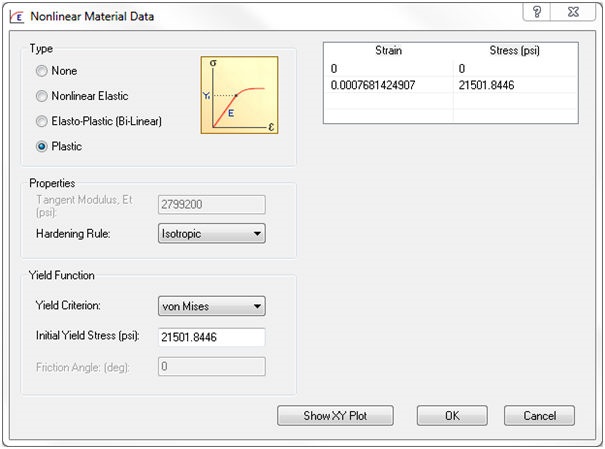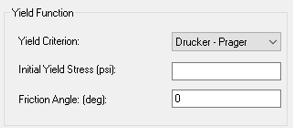On the Material form, under the Analysis Specific Data section, click the Nonlinear button. Then select the Plastic option under Type. The following window pops up:

- This option is similar to
Elasto-Plastic but does not use a
Tangent Modulus
 .
.
- The stress-strain values have to be entered in a similar way to the Nonlinear Elastic option.
- These values must be defined in the first quadrant.
- The first two sets of points are filled in automatically so that the slope of the line connecting the two points is always equal to the Young’s Modulus value of the material.
- Hence, based on the Initial Yield Stress value, the amount of plastic strain percentage in the table is adjusted to maintain this relationship.
- The first two points cannot be deleted or modified.
The following applies to both Elasto-Plastic and Plastic options.
- Three types of
Hardening Rules are available:
- Isotropic
- Kinematic
- Isotropic + Kinematic (Combined)
- Four types of
Yield Criterion are available. Various extra input data are required from you:
- von Mises: This is most widely used for ductile materials.
- Requires Initial Yield Stress value.
-
Tresca: Also applicable to ductile materials in general but more conservative than von Mises.
- Also needs Initial Yield Stress value.
- Mohr-Coulomb: This theory is applicable to frictional materials like soil and concrete.
- Requires a 2*Cohesion value, in units of stress.
- Requires a Friction Angle value, 0<Φ<45 in degrees, default zero.
- Drucker-Prager: An approximation to the
Mohr-Coulomb theory, it is a modification to the
von Mises theory. Also applicable to frictional materials like soil and concrete.
- Requires a 2*Cohesion value, in units of stress.
- Requires a Friction Angle value, 0<Φ<45 in degrees, default zero.
- von Mises: This is most widely used for ductile materials.
- Initial Yield Stress: This value also has a default value which is extracted from the material library data for each selected material. It has other defaults if the material is not loaded from a library.
- Specific to Explicit analysis:

- Requires Initial Yield Stress value.
- Requires a Friction Angle value, in degrees, default zero.